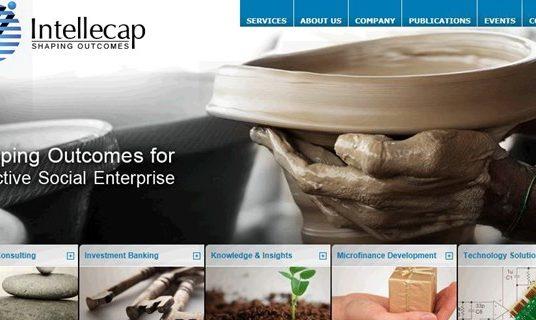
Published in the Economic Times, November 21, 2011
Age at starting business: 30 years
Company name: Intellecap
Headquarters: Hyderabad
Seed capital: Rs 1 lakh (~ USD 2000 )
Source of money: Parents-in-law, personal savings
Turnover after first year: Rs 12 lakh (~ USD 26,000)
Turnover in 2010-11: Rs 30 crore (~ USD 6 Mn)
L to R: Sanjib Jha (CFO), Satish Pai (VP Investment Banking), Manju George (Co-Founder), Anurag Agrawal (Co-Founder), Vineet Rai (Co-Founder and Chairman), Shree Ravindranath (Co-Founder)
In a country where advice is abundant and free, making a career out of it may seem like a risky proposition. Fortunately for me, the gamble paid off. My microfinance advisory, Intellecap, has generated a turnover of Rs 30 crore this year. The journey, however, hasn’t been easy. Born in a middle class family in Uttar Pradesh, I graduated from the Indian Institute of Forest Management (IIFM), Bhopal, in 1994 and was picked up by the Ballarpur Paper Mills at Boinda in Orissa. I was responsible for the distribution of raw material (wood/ bamboo) used in making paper.
After three years in the paper industry, I moved to IIM Ahmedabad in 1997 to work on the research for the Biological Diversity Act of 2002. My job was to engage with a panel of experts, which would advise the government on the access and beneficiary methods related to the Act.
A year into this, the Gujarat government approached me to take charge of the Gujarat Grassroots Innovations Augmentation Network (GIAN), an incubator for grassroot rural innovation and development in the state. I accepted the offer because after living in a forest for three years and being exposed to extreme poverty, I could relate to the need for encouraging rural enterprise. As the CEO of GIAN, I was responsible for identifying, nurturing and launching micro-level enterprises for poverty alleviation.
While working with farmers, I realised that merely providing capital was not enough. They had no knowledge or experience in handling businesses, and needed guidance and manpower to ensure optimum utilisation of funds. This sparked off the idea for Aavishkaar, a social venture capital fund, which I set up after quitting GIAN in 2001.
Simultaneously, I was mulling the possibility of building an intensive support system that would help social entrepreneurs build and execute their business plans with the help of ‘intellectual capital’. This was the genesis of Intellecap. In February 2002, I shifted base to Mumbai, and a month later, the company was born with a seed capital of Rs 1 lakh. This money came from my savings and those of my wife, along with some help from my in-laws. My wife is a 50% stakeholder in the company. Our first office? Our home at Kandivali.
Getting paid to dole out advice was easier said than done, and we managed to bag our first project only in late 2002 for a small social fund called Tungari Manohar Social Venture. It happened when on an Ahmedabad-Mumbai flight I bumped into a man, who wanted to start a fund and make a social impact. From this project, we earned Rs 12 lakh in six months. However, by 2003, we were almost bankrupt. At this point, the company was still a two-person show.Ironically, it was free advice that bailed us out.
In December 2003, Vijay Mahajan, a friend and ex-colleague from IIM-A, suggested I foray into advisory services for microfinance. That’s just what I did, and the tide turned. In March 2004, we got our first client in microfinance through references. It was a Website for World Bank Microfinancegateway.org. That year the company raked in Rs 30 lakh and our turnover was Rs 50 lakh.
The same year, Intellecap got its co-founders. Aparajita Agarwal, whom I knew from my IIFM days, joined in late 2004, along with Anurag Agarwal from TA Pai Management Institute, Manipal. In 2005-6, Shree Ravindranath, also from IIFM, Manju Mary George from the Institute of Rural Management, Anand , and Atreya Royarpalou, an IIT-ISB alumnus, came on board. This core group introduced fresh vision, our advice was branded valuable and we earned Rs 1.5 crore in 2005-6.
The next milestone came in October 2007, when the company received an equity investment of about $8.4 million (Rs 42 crore) from Legatum Global Development, a Dubai- and London-based private firm, which invests in microfinance initiatives and had hired us to work for them earlier. After 18 months of negotiations, we received the funds and used much of these to set up infrastructure and recruit people.
Till 2008, microfinance institutions remained our strong point, but then we started focusing on social sectors like organic agriculture, health, education, etc. Today Intellecap has four more firms-Intellecash (2009), a non-banking microfinance firm; Intellecap Inc (2009), a US-based subsidiary; Intellecap Software Technologies (2011), a technology solutions company, and Intellecap Growth Finance (2011), a non-banking finance company focussing on small and medium enterprises. Recently, we shifted our head office from Mumbai to Hyderabad to maximise cost efficiency. Our short-term goal is to acquire a subsidiary of a UK company and then have a footprint across the globe. We also want to generate a turnover of Rs 100 crore in the next three years.
(As told to Milan Sharma)
